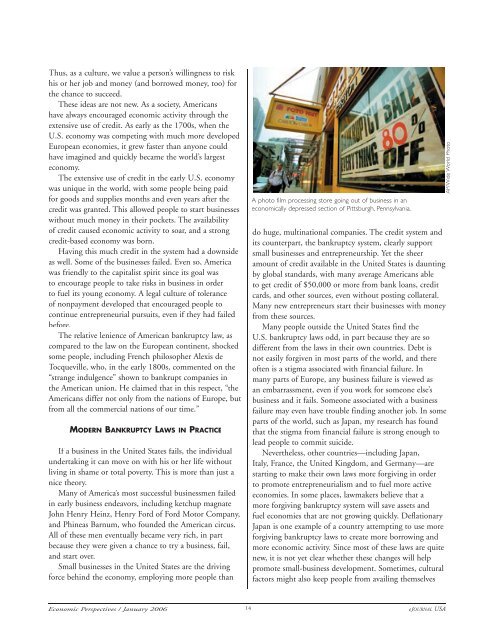Entrepreneurship and Small Business - Embassy of the United States
Entrepreneurship and Small Business - Embassy of the United States
Entrepreneurship and Small Business - Embassy of the United States
Create successful ePaper yourself
Turn your PDF publications into a flip-book with our unique Google optimized e-Paper software.
Thus, as a culture, we value a person’s willingness to risk<br />
his or her job <strong>and</strong> money (<strong>and</strong> borrowed money, too) for<br />
<strong>the</strong> chance to succeed.<br />
These ideas are not new. As a society, Americans<br />
have always encouraged economic activity through <strong>the</strong><br />
extensive use <strong>of</strong> credit. As early as <strong>the</strong> 1700s, when <strong>the</strong><br />
U.S. economy was competing with much more developed<br />
European economies, it grew faster than anyone could<br />
have imagined <strong>and</strong> quickly became <strong>the</strong> world’s largest<br />
economy.<br />
The extensive use <strong>of</strong> credit in <strong>the</strong> early U.S. economy<br />
was unique in <strong>the</strong> world, with some people being paid<br />
for goods <strong>and</strong> supplies months <strong>and</strong> even years after <strong>the</strong><br />
credit was granted. This allowed people to start businesses<br />
without much money in <strong>the</strong>ir pockets. The availability<br />
<strong>of</strong> credit caused economic activity to soar, <strong>and</strong> a strong<br />
credit-based economy was born.<br />
Having this much credit in <strong>the</strong> system had a downside<br />
as well. Some <strong>of</strong> <strong>the</strong> businesses failed. Even so, America<br />
was friendly to <strong>the</strong> capitalist spirit since its goal was<br />
to encourage people to take risks in business in order<br />
to fuel its young economy. A legal culture <strong>of</strong> tolerance<br />
<strong>of</strong> nonpayment developed that encouraged people to<br />
continue entrepreneurial pursuits, even if <strong>the</strong>y had failed<br />
before.<br />
The relative lenience <strong>of</strong> American bankruptcy law, as<br />
compared to <strong>the</strong> law on <strong>the</strong> European continent, shocked<br />
some people, including French philosopher Alexis de<br />
Tocqueville, who, in <strong>the</strong> early 1800s, commented on <strong>the</strong><br />
“strange indulgence” shown to bankrupt companies in<br />
<strong>the</strong> American union. He claimed that in this respect, “<strong>the</strong><br />
Americans differ not only from <strong>the</strong> nations <strong>of</strong> Europe, but<br />
from all <strong>the</strong> commercial nations <strong>of</strong> our time.”<br />
MODERN BANKRUPTCY LAWS IN PRACTICE<br />
If a business in <strong>the</strong> <strong>United</strong> <strong>States</strong> fails, <strong>the</strong> individual<br />
undertaking it can move on with his or her life without<br />
living in shame or total poverty. This is more than just a<br />
nice <strong>the</strong>ory.<br />
Many <strong>of</strong> America’s most successful businessmen failed<br />
in early business endeavors, including ketchup magnate<br />
John Henry Heinz, Henry Ford <strong>of</strong> Ford Motor Company,<br />
<strong>and</strong> Phineas Barnum, who founded <strong>the</strong> American circus.<br />
All <strong>of</strong> <strong>the</strong>se men eventually became very rich, in part<br />
because <strong>the</strong>y were given a chance to try a business, fail,<br />
<strong>and</strong> start over.<br />
<strong>Small</strong> businesses in <strong>the</strong> <strong>United</strong> <strong>States</strong> are <strong>the</strong> driving<br />
force behind <strong>the</strong> economy, employing more people than<br />
A photo film processing store going out <strong>of</strong> business in an<br />
economically depressed section <strong>of</strong> Pittsburgh, Pennsylvania.<br />
do huge, multinational companies. The credit system <strong>and</strong><br />
its counterpart, <strong>the</strong> bankruptcy system, clearly support<br />
small businesses <strong>and</strong> entrepreneurship. Yet <strong>the</strong> sheer<br />
amount <strong>of</strong> credit available in <strong>the</strong> <strong>United</strong> <strong>States</strong> is daunting<br />
by global st<strong>and</strong>ards, with many average Americans able<br />
to get credit <strong>of</strong> $50,000 or more from bank loans, credit<br />
cards, <strong>and</strong> o<strong>the</strong>r sources, even without posting collateral.<br />
Many new entrepreneurs start <strong>the</strong>ir businesses with money<br />
from <strong>the</strong>se sources.<br />
Many people outside <strong>the</strong> <strong>United</strong> <strong>States</strong> find <strong>the</strong><br />
U.S. bankruptcy laws odd, in part because <strong>the</strong>y are so<br />
different from <strong>the</strong> laws in <strong>the</strong>ir own countries. Debt is<br />
not easily forgiven in most parts <strong>of</strong> <strong>the</strong> world, <strong>and</strong> <strong>the</strong>re<br />
<strong>of</strong>ten is a stigma associated with financial failure. In<br />
many parts <strong>of</strong> Europe, any business failure is viewed as<br />
an embarrassment, even if you work for someone else’s<br />
business <strong>and</strong> it fails. Someone associated with a business<br />
failure may even have trouble finding ano<strong>the</strong>r job. In some<br />
parts <strong>of</strong> <strong>the</strong> world, such as Japan, my research has found<br />
that <strong>the</strong> stigma from financial failure is strong enough to<br />
lead people to commit suicide.<br />
Never<strong>the</strong>less, o<strong>the</strong>r countries—including Japan,<br />
Italy, France, <strong>the</strong> <strong>United</strong> Kingdom, <strong>and</strong> Germany—are<br />
starting to make <strong>the</strong>ir own laws more forgiving in order<br />
to promote entrepreneurialism <strong>and</strong> to fuel more active<br />
economies. In some places, lawmakers believe that a<br />
more forgiving bankruptcy system will save assets <strong>and</strong><br />
fuel economies that are not growing quickly. Deflationary<br />
Japan is one example <strong>of</strong> a country attempting to use more<br />
forgiving bankruptcy laws to create more borrowing <strong>and</strong><br />
more economic activity. Since most <strong>of</strong> <strong>the</strong>se laws are quite<br />
new, it is not yet clear whe<strong>the</strong>r <strong>the</strong>se changes will help<br />
promote small-business development. Sometimes, cultural<br />
factors might also keep people from availing <strong>the</strong>mselves<br />
AP/Wide World Photo<br />
Economic Perspectives / January 2006 14<br />
eJOURNALe USA












